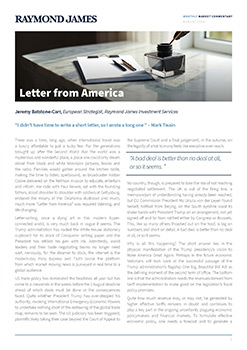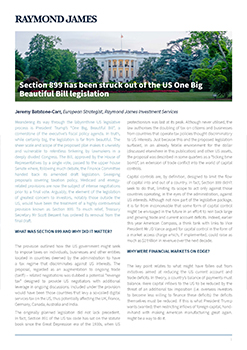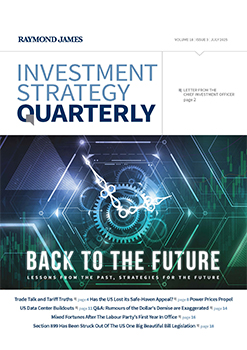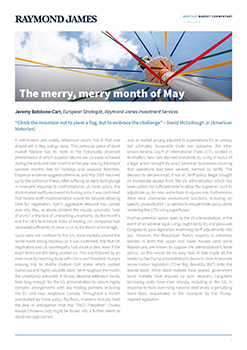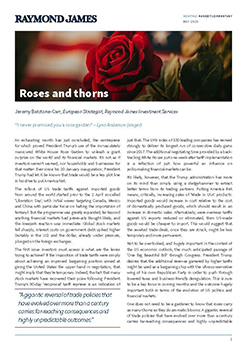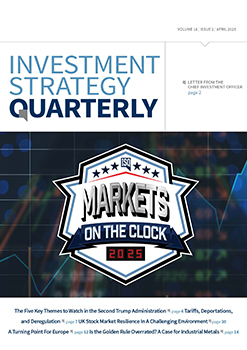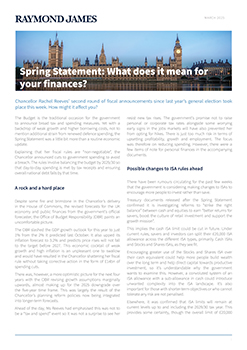A challenging quarter closed on Monday, with the start to the second quarter starting with a bang, as Trump’s “Liberation Day” created extreme volatility in equity markets, leading to the worst day in five years for US equities.
The start of 2025 has proved challenging for US equities, after two years of exceptional performance. It has been the worst quarter relative to global excluding US equities in over twenty years as investors seemingly became nervous about high valuations, increased global uncertainty and a deteriorating growth outlook. It wasn’t just US equities that struggled, with small and mid-cap equities continuing to face selling pressure. UK mid cap stocks underperformed their large cap counterparts by over 10% in the first quarter.
Economic data took a back seat this week with investors focus firmly on “Liberation Day”, where Donald Trump announced a raft of tariffs aimed at reducing the US trade deficit, raising revenues and supporting American produced goods. The tariffs have been far reaching with a minimum 10% tariff on imports coming into the US. The uninhabited Heard & McDonald Islands were even included in the tariff list. While it has been no secret that Trump was keen to implement tariffs, equity markets took the official confirmation of tariffs badly, with trillions of dollars wiped from markets on Thursday. The impact of Trump’s reciprocal tariffs are hard to know at this stage, and there are likely to be retaliatory tariffs on the US announced in the coming days. There is also the prospect that some nations will negotiate deals with the US, while there are even musings that US courts could potentially look to block the imposing of tariffs. Whatever views are on Trump and his administration’s tariff policy, it seems clear they are serious about tariffs and see them as a mechanism to address their budget deficit through raising external revenues, to stimulate their domestic manufacturing base through the re-shoring of production and potentially strengthening foreign currencies, which they view as too cheap. Their approach seems fraught with danger, and the job will be made harder if economic growth is hit too much, something that must be now a possibility as global growth slows due to tariffs and the associated uncertainties this brings. We have already seen business and consumer sentiment deteriorate over Q1 and this is only likely to continue in the coming months.
Global equity markets sold off heavily on Thursday after Trump’s announcements on Wednesday evening . Ironically it was the US equity market that was one of the worst hit, with the main index falling over 4%, and the tech-heavy and small cap indices falling over 5%. There was over $3 trillion wiped from US equity markets. Historically, risk-off markets have normally seen the US Dollar strengthen, however, we saw the US Dollar fall against a range of currencies, including the Euro, Japanese Yen and Sterling. Here in the UK we saw equity markets fall around 2%, with cyclicals bearing much of the pain. The bright spots in equity markets came from sectors such as utilities and consumer staples which are more traditional defensive sectors, with much less cyclical business models. Weakness in equities spilled over into Friday, with Asian and European markets declining further. The move down was accelerated by the news that China has put retaliatory tariffs of 34% on all US imports, starting 10th April. There is an expectation that we will see a similar response from Europe in the coming days.
While equities declined, fixed income markets offered investors some reprieve, with government bonds rallying. Given tariffs are expected to have a negative impact on global growth, investors are now pricing in increased interest rate cuts in developed markets, which has supported government bond prices. Here in the UK, there is now a 90% probability of a rate cut at the next Bank of England meeting in May. Over in the US there is expected to be 3-4 interest rate cuts in 2025 and this has led to the yield on the 10-year government bond falling below 4%.
Commodities have come under pressure driven by deteriorating growth outlooks. Crude oil has fallen around 7% on Thursday and Friday, falling to $62 a barrel. Lower oil prices should ease some inflationary pressures in the system and help businesses and the consumer over coming months through lower energy and petrol prices.
The week ended with key US employment data, the monthly release of US non-farm payrolls. Data was positive, showing 228,000 jobs had been added to the economy, considerably ahead of consensus. While labour data can be considered a lagging indicator, it will please investors to see such resilience.
It has been a very challenging week, with the official confirmation of US tariffs sending equities into a tailspin. We are in the eye of the storm presently and making big investment decisions at moments of stress are fraught with behavioural danger. The world can feel very uncertain, but volatility can create opportunities, particularly for long-term investors. Within portfolios, while being unable to avoid drawdowns, we have been able to limit downsides through a diversified approach in our equity bucket (not simply having a one-way bet on the US equity market and US Dollar), and we have exposure to assets that have risen over recent days, such as government and corporate bonds and infrastructure equities. With investor emotions running high, it is important to take a balanced approach to investing and weigh up both potential risks, but equally opportunities. It’s clear that many assets have become meaningfully cheaper over the last 48 hours, however, there are now new risks to consider, which potentially changes the make up of global trade going forward.
Andy Triggs, Head of Investments
Risk warning: With investing, your capital is at risk. The value of investments and the income from them can go down as well as up and you may not recover the amount of your initial investment. Certain investments carry a higher degree of risk than others and are, therefore, unsuitable for some investors.


